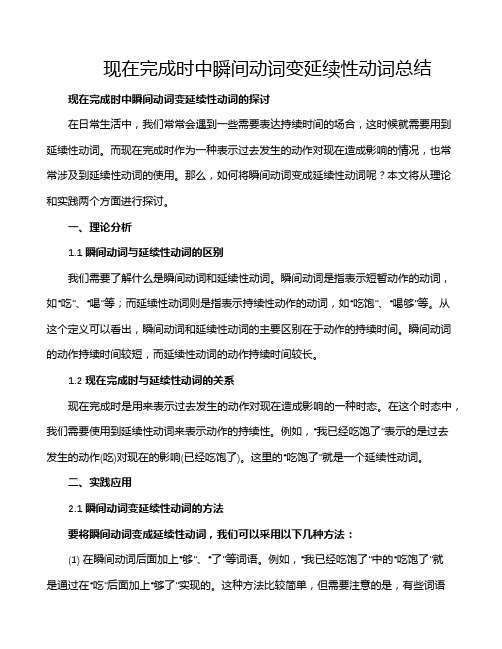现在完成时中的“延续性”问题
现在完成时中瞬间动词变延续性动词总结

现在完成时中瞬间动词变延续性动词总结现在完成时中瞬间动词变延续性动词的探讨在日常生活中,我们常常会遇到一些需要表达持续时间的场合,这时候就需要用到延续性动词。
而现在完成时作为一种表示过去发生的动作对现在造成影响的情况,也常常涉及到延续性动词的使用。
那么,如何将瞬间动词变成延续性动词呢?本文将从理论和实践两个方面进行探讨。
一、理论分析1.1 瞬间动词与延续性动词的区别我们需要了解什么是瞬间动词和延续性动词。
瞬间动词是指表示短暂动作的动词,如“吃”、“喝”等;而延续性动词则是指表示持续性动作的动词,如“吃饱”、“喝够”等。
从这个定义可以看出,瞬间动词和延续性动词的主要区别在于动作的持续时间。
瞬间动词的动作持续时间较短,而延续性动词的动作持续时间较长。
1.2 现在完成时与延续性动词的关系现在完成时是用来表示过去发生的动作对现在造成影响的一种时态。
在这个时态中,我们需要使用到延续性动词来表示动作的持续性。
例如,“我已经吃饱了”表示的是过去发生的动作(吃)对现在的影响(已经吃饱了)。
这里的“吃饱了”就是一个延续性动词。
二、实践应用2.1 瞬间动词变延续性动词的方法要将瞬间动词变成延续性动词,我们可以采用以下几种方法:(1) 在瞬间动词后面加上“够”、“了”等词语。
例如,“我已经吃饱了”中的“吃饱了”就是通过在“吃”后面加上“够了”实现的。
这种方法比较简单,但需要注意的是,有些词语并不能直接与瞬间动词搭配,如“看”、“听”等。
这时,我们可以使用“看完”、“听完”等词语来替代。
(2) 将瞬间动词变为动名词。
例如,“我吃完饭就去睡觉”可以改为“我吃完饭后就去睡觉”。
这里,“吃饭”变成了动名词“吃饭”,实现了从瞬间动词到延续性动词的转变。
这种方法适用于大多数情况,但需要注意的是,动名词本身并不具备时态的意义,因此在使用时需要注意上下文的时态。
2.2 现在完成时变延续性动词的例子下面我们通过几个例子来说明如何将现在完成时变为目标时态。
现在完成时延续性与暂短性动词用法

现在完成时(短暂性动词与延续性动词)的用法基本结构:主语+have/has+过去分词(done)①肯定句:主语+have/has+过去分词+其他②否定句:主语+have/has+not+过去分词+其他③一般疑问句:Have/Has+主语+过去分词+其他④特殊疑问句:特殊疑问词+一般疑问句(have/has+主语+过去分词+其他)(1)现在完成时用来表示现在之前已发生过或完成的动作或状态,但其结果却和现在有联系,也就是说,动作或状态发生在过去但它的影响现在还存在.I have spent all of my money.(含义是:现在我没有钱花了.)Jane has laid the table.(含义是:现在桌子已经摆好了.)Michael has been ill.(含义是:现在仍然很虚弱)He has returned from abroad. (含义是:现在已在此地)(2)现在完成时可以用来表示发生在过去某一时刻的,持续到现在的动作(用行为动词表示)或状态(be动词表示)常与for(+时间段),since(+时间点或过去时的句子)连用. Mary has been ill for three days.I have lived here since 1998.注(超重要):瞬间动词(buy,die,join,lose……)不能直接与for since 连用。
要改变动词come-be go out-be out finish-be over open-be opendie-be dead1.have代替buyMy brother has had(不能用has bought) this bike for almost four years.2、用keep或have代替borrowI have kept(不能用have borrowed) the book for quite a few days.3、用be替代becomeHow long has your sister been a teacher?4、用have a cold代替catch a coldTom has had a cold since the day before yesterday.5、用wear代替put onb)用“be+形容词”代终止性动词1、be+married代marry2、be+ill代fall (get) ill3、be+dead代die4、be+asleep代fall (get) asleep5、be+awake代wake/wake up6、be+gone代lose,die,sell,leave7、be+open代open 8、be closed代close/shut9、be+missing(gone,lost)代losec)用“be+副词”代终止性动词1“be+on”代start,begin2“be+up”代get up3“be+back(to)”代return to,come back to,go back to4“be here (there)”代come(arrive,reach,get) here或go (arrive,reach,get) there等等d)用“be+介词短语”代终止性动词1.“be in/at +地点”代替go to /come to2.用be in the army 代替join the army3.“be in/at +地点”代替move to常用瞬间动词变延续性动词表:1. have arrived at/in sw. got to/reached sw. come/gone/moved to sw.→have been in sw./at…相应的介词2. have come/gone back/returned → have been back3. have come/gone out →have b een out4. have become → have been5. have closed / opened→ have been close/open6. have got up → have been up;7. have died → have been dead;8. have left sw. → have been away from sw.9. have fallen asleep/got to sleep → have been asleep;10. have finished/ended/completed → have been over;11. Have married → have been married;12. have started/begun to do sth. → have done sth. ;13. have begun → have been on14. have borrowed/bought →have kept/had15. have lost → haven’t had16. have put on →have worn17. have caught /get a cold → have had a cold;18. have got to know → have known19. have/has gone to → have been in20. have joined/have taken part in the league/the Party/the army→have been a member of/ have been in/have been the Party’s member/the league member/the soldier…注意:1.现在完成时不能单独与准确时间连用,(如表示过去的时间状语)如yesterday(morning、afternoon),last(morning、afternoon)等,除非与for,since连用.2.现在完成时往往同表示不确定的过去时间状语连用,如already(肯定), yet(否定,疑问), just, before, recently,still, lately等:He has already obtained(得到\获得) a scholarship(奖学金).I haven't seen much of him recently (lately).We have seen that film before.Have they found the missing child yet ?3. 现在完成时常常与表示频度的时间状语连用,如often, sometimes, ever, never, twice等:Have you ever been to BeijingI have never heard Bunny say anything against her.I have used this pen only three times. It is still good.4. 现在完成时还往往可以同包括现在时间在内的时间状语连用,如now, these days/weeks/months/years, this morning/week/month/year, just, today, so far 等:Peter has written six papers so far.There has been too much rain in San Francisco this year.5.现在完成时的"完成用法"现在完成时的"完成用法"指的是动作发生在过去某一时刻并已结束,但该动作对现在产生了影响,与现在情况具有因果关系。
现在完成时延续性动词与非延续(瞬间性)动词

• It began to rain at eight yesterday morning .(正)又如:
• -When did you get to know Jack?
• -Two years ago.
•Then you've known each other for more th an two years.
• 一、延续性动词可以与表示时间段的状语连用。 表示时间段的短语有:
• for+一段时间,如:for 2 years,for a long time; since从句, 如:since he came here;
• since+时间点名词, 如:since last year, since 5 days ago; how long等。
• 2.延续性动词不能与表示短暂时间的"点时 间"状语连用。如: It raind at eight yesterday morning.(误 ) rain为延续性动词,而at eight表示"点时间 ",前后显然矛盾。如果用延续性动词表示 一瞬间的动作,可以借助come, begin, get 等终止性动词来表示。上句可改为
• 如:for 3 years,since he came here,how long,ect.且看下面三个错误句子:
• 1)Jim has come here for five years.
• 2)He has died for 3 years.
• 否定的终止性动词可以与表示时间段的时间状 语连用。
eg. I bought the book 5 days ago. I have had the book for 5 days.
短暂性动词与延续性动词的用法

初中英语中短暂性动词与延续性动词的用法英语中,按动词延续的时间长短,可将动词分为延续性动词和短暂性动词。
延续性动词如learn, study, work, play, wait等。
短暂性动词是非延续性动词,即动作一开始便结束的动词,又可称结束性动词,瞬间动词,如come, go, begin, start, become, join, end, die, buy, arrive,reach, borrow, lend, get to know等。
一.短暂性动词与延续性动词在现在完成时中的用法:现在完成时中用法(一):表示发生在过去,迄今已经完成,并对现在产生影响或产生结果的动作,常用ever, yet, already, just等状语,谓语动词既不过延续性动词,也不过短暂性动词。
如:She has just borrowed the book from the library.(borrow是短暂性动词)I have learned a little about Japanese. (learn 是延续性动词)现在完成时中用法(二):表示始于过去某时并一直延续到现在的动作或状态,常与表示始于过去某一时刻并一直延续到现在的时间状语连用。
如:They have lived in Nantong since 1990. (live 是延续性动词)Mr. Black has worked here since he came to China.(work 是延续性动词)I have learned English for two and a half years.(learn 是延续性动词)所以,在现在完成时中用法(二)中,在表示持续一段时间的句子中,应将短暂性动词转化为相同意义的延续性动词或状态动词。
初中英语中常见的有:例如:1. His grandfather has died for ten years.(F)His grandfather has been dead for ten years.(T) 2. My brother has joined the army for five years.(F)My brother has been in the army for five years.(T) My brother has been an armyman for ten years.(F)3. He has gone away for a week.(F) He has been away for a week.(T)4. The film has begun for fifteen minutes.(F)The film has been on for fifteen minutes.(T)但是,短暂性动词的现在完成时的否定形式能够表示一种延续的状态,所以能够和表示一段的状语连用。
延续性与非延续性动词在现在完成时态中的使用

延续性与非延续性动词在现在完成时态中的使用
延续性动词和非延续性动词在现在完成时态中的使用有一些区别。
1.延续性动词:
延续性动词表示持续的动作或状态,常见的有live(住)、work
(工作)、study(学习)、wait(等待)等。
在现在完成时态中,延续
性动词通常用来表示一个动作或状态开始于过去,持续到现在,并且可能
会继续下去。
例如:
- I have lived in this city for 10 years.(我在这个城市住了
10年了。
)
2.非延续性动词:
非延续性动词表示瞬间动作或不可数的状态,常见的有arrive(到达)、die(死亡)、finish(完成)、know(知道)等。
在现在完成时
态中,非延续性动词通常用来表示一个动作已经完成或一个状态已经发生,没有持续的时间。
例如:
- She has arrived at the airport.(她已经到达了机场。
)
- The project has finished.(项目已经完成了。
)
- I have known him since childhood.(我从小就认识他了。
)
需要注意的是,有些动词既可以是延续性动词,也可以是非延续性动词,根据上下文来决定其使用方式。
比如,动词sleep(睡觉)可以是延
续性动词,表示持续的睡眠状态,也可以是非延续性动词,表示一次性的睡眠动作。
现在完成时延续性与暂短性动词用法

现在完成时(短暂性动词与延续性动词)的用法基本结构:主语+have/has+过去分词(done)①肯定句:主语+have/has+过去分词+其他②否定句:主语+have/has+not+过去分词+其他③一般疑问句:Have/Has+主语+过去分词+其他④特殊疑问句:特殊疑问词+一般疑问句(have/has+主语+过去分词+其他)(1)现在完成时用来表示现在之前已发生过或完成的动作或状态,但其结果却和现在有联系,也就是说,动作或状态发生在过去但它的影响现在还存在.I have spent all of my money.(含义是:现在我没有钱花了.)Jane has laid the table.(含义是:现在桌子已经摆好了.)Michael has been ill.(含义是:现在仍然很虚弱)He has returned from abroad. (含义是:现在已在此地)(2)现在完成时可以用来表示发生在过去某一时刻的,持续到现在的动作(用行为动词表示)或状态(be动词表示)常与for(+时间段),since(+时间点或过去时的句子)连用.Mary has been ill for three days.I have lived here since 1998.注(超重要):瞬间动词(buy,die,join,lose……)不能直接与for since 连用。
要改变动词come-be go out-be out finish-be over open-be opendie-be dead1.have代替buyMy brother has had(不能用has bought) this bike for almost four years.2、用keep或have代替borrowI have kept(不能用have borrowed) the book for quite a few days.3、用be替代becomeHow long has your sister been a teacher?4、用have a cold代替catch a coldTom has had a cold since the day before yesterday.5、用wear代替put onb)用“be+形容词”代终止性动词1、be+married代marry2、be+ill代fall (get) ill3、be+dead代die4、be+asleep代fall (get) asleep5、be+awake代wake/wake up6、be+gone代lose,die,sell,leave7、be+open代open 8、be closed代close/shut9、be+missing(gone,lost)代losec)用“be+副词”代终止性动词1“be+on”代start,begin2“be+up”代get up3“be+back(to)”代return to,come back to,go back to4“be here (there)”代come(arrive,reach,get) here或go(arrive,reach,get) there等等d)用“be+介词短语”代终止性动词1.“be in/at +地点”代替go to /come to2.用be in the army 代替join the army3.“be in/at +地点”代替move to常用瞬间动词变延续性动词表:1. have arrived at/in sw. got to/reached sw. come/gone/moved to sw.→have been in sw./at…相应的介词2. have come/gone back/returned → have been back3. have come/gone out →have b een out4. have become → have been5. have closed / opened→ have been close/open6. have got up → have been up;7. have died → have been dead;8. have left sw. → have been away from sw.9. have fallen asleep/got to sleep → have been asleep;10. have finished/ended/completed → have been over;11. Have married → have been married;12. have started/begun to do sth. → have done sth. ;13. have begun → have been on14. have borrowed/bought →have kept/had15. have lost → haven’t had16. have put on →have worn17. have caught /get a cold → have had a cold;18. have got to know → have known19. have/has gone to → have been in20. have joined/have taken part in the league/the Party/the army→have been a member of/ have been in/have been the Party’s member/the league member/the soldier…注意: 1.现在完成时不能单独与准确时间连用,(如表示过去的时间状语)如yesterday(morning、afternoon),last(morning、afternoon)等,除非与for,since连用.2.现在完成时往往同表示不确定的过去时间状语连用,如already(肯定), yet(否定,疑问), just, before, recently,still, lately等:He has already obtained(得到\获得) a scholarship(奖学金).I haven't seen much of him recently (lately).We have seen that film before.Have they found the missing child yet ?3. 现在完成时常常与表示频度的时间状语连用,如often, sometimes, ever, never, twice等:Have you ever been to BeijingI have never heard Bunny say anything against her.I have used this pen only three times. It is still good.4. 现在完成时还往往可以同包括现在时间在内的时间状语连用,如now, these days/weeks/months/years, thismorning/week/month/year, just, today, so far等:Peter has written six papers so far.There has been too much rain in San Francisco this year.5.现在完成时的"完成用法"现在完成时的"完成用法"指的是动作发生在过去某一时刻并已结束,但该动作对现在产生了影响,与现在情况具有因果关系。
现在完成时之瞬间动词转变为持续性动词

现在完成时之瞬间动词转变为持续性动词一、兴趣导入:Teacher: Tom, why are you late for school every day?Tom: Every time I come to the corner, a sign says, "School-Go Slow".二、知识点回顾:现在完成时基本用法三、(1)专题讲解:在完成时中,一个瞬间性动词(一次性动作)不能与表示一段时间的状语(for, since, how long等)连用,此时须将该瞬间动词改为延续性动词或状态动词.Eg:buy ( bought ) --- have / has had 买borrow (borrowed) --- have / has kept 借die ( died ) --- have / has been dead 死leave ( left ) --- have / has been away ( from ) 离开begin ( began ) --- have / has been on 开始join ( joined) --- have / has been in 参加--- have / has been a ( party) membergo (went) --- have / has been there / in 去come/arrive/reach/get to --- have / has been here / in 来/到达end (ended) ----- have/has been over 结束eg. The film began five minutes ago.------The film has been on for five minutes.------It has been five minutes since the film began.用“be+形容词”代终止性动词1、be+married代marry2、be+ill代fall (get) ill3、be+dead代die4、be+asleep代fall (get) asleep5、be+awake代wake/wake up6、be+gone代lose,die,sell,leave7、be+open代open8、be closed代close/shut用“be+副词”代终止性动词1“b e+on”代start,begin2“be+up”代get up3“be+back(to)”代return to,come back to,go back to4“be here (there)”代come(arrive,reach,get) here或go (arrive,reach,get) there等等用“be+介词短语”代终止性动词1.“be in/at +地点”代替go to /come to2.用be in the army 代替join the army3.“be in/at +地点”代替move to四、巩固练习:将瞬间动词变成延续性动词表:1. have arrived at/in....... got to/reached...... come/gone/moved to...... →2. have come/gone back/returned →3. have come/g one out →4. have become →5. have closed / opened→6. have fallen ill→7. have died →8. have left...... →9. have fallen asleep/got to sleep →10. have finished/ended/completed →11. have married →12. have begun →13. have borrowed/bought →14. have/has gone to →15. have joined/have taken part in the league/the Party/the army→五、拓展训练:1.你曾经吃过鱼和薯条吗?2. 我刚刚丢了我的化学书。
修改名词:现在完成时练习(短暂性动词与延续性动词的转换)

修改名词:现在完成时练习(短暂性动词与延续性动词的转换)现在完成时是英语语法中一种重要的时态,用于表示发生在过去但与现在有关的动作或经验。
在构成现在完成时的句子中,我们经常需要使用动词的现在分词形式。
然而,对于一些动词,我们需要将其转换为名词形式。
短暂性动词的转换短暂性动词是指表示短暂或瞬间动作的动词,这些动作不具有持续性。
在现在完成时句子中,我们需要将短暂性动词转换为名词形式。
举个例子:- 原始句子:He drank a cup of coffee.- 转换后的句子:He has had a cup of coffee.在这个例子中,我们将短暂性动词"drank"转换为名词形式"had"。
以下是一些常见的短暂性动词及其对应的转换形式:- bring -> have brought- eat -> have eaten- see -> have seen- take -> have taken- buy -> have bought延续性动词的转换延续性动词是指表示持续性或进行性动作的动词,这些动作具有一定的时间跨度。
在现在完成时句子中,我们需要将延续性动词转换为名词形式。
举个例子:- 原始句子:She has been reading a book.- 转换后的句子:She has had a book.在这个例子中,我们将延续性动词"reading"转换为名词形式"had"。
以下是一些常见的延续性动词及其对应的转换形式:- read -> have had- write -> have written- study -> have studied- work -> have worked- play -> have played通过将短暂性动词和延续性动词转换为名词形式,我们可以更准确地表达现在完成时的动作或经验。
- 1、下载文档前请自行甄别文档内容的完整性,平台不提供额外的编辑、内容补充、找答案等附加服务。
- 2、"仅部分预览"的文档,不可在线预览部分如存在完整性等问题,可反馈申请退款(可完整预览的文档不适用该条件!)。
- 3、如文档侵犯您的权益,请联系客服反馈,我们会尽快为您处理(人工客服工作时间:9:00-18:30)。
现在完成时中的“延续性”问题
英语中有些动词表示的是一种短暂的动作,没有持续性,即“一发生就结束”的动作,这类动词一般称为“非延续性动词”(亦叫点动词或瞬间动词或终止性动词),在现在完成时中,不能同表示一段时间的状语或How long连用。
常见的这类动词有:go, come, leave, arrive, lose, join, borrow, die, begin. 这些动词如果要跟一段时间连用,必须改成相应的具有延续性
a) 非延续性动词可用于现在完成时,但不能与表示一段时间的时间状语连用;
The train has arrived.火车到了。
The train has been here for two hours. 火车到这里已经两个小时了。
The boy has left. 那个男孩走了。
The boy has been away for two days. 那个男孩离开已经两天了。
b) 表示一段时间的时间状语一般为:
①How long…?
②for +一段时间;
③since+一点时间。
c) 非延续性动词的否定形式可以与一段时间连用。
He hasn’t left home for a month.
I haven’t seen you for a long time.
A. 用所给的时间状语改写句子:
1. He left Nanjing three days ago. (for three days)
________________________________________
2. The poor man has died. (for many years)
________________________________________
3. We have bought this house. (for a long time)
________________________________________
4. The Greens have come to China. (since 1998)
________________________________________
5. Sally borrowed this book from the school library two weeks ago. (for two weeks) ________________________________________
B. 翻译句子:
1. 这台电脑我已经买了很长时间了。
2. 这本杂志他已经借了几乎一个星期了。
3. 自上个周五以来这些游客一直呆在南京。
4. 那位老人去世已经有相当一段时间了。
5. 电影开始多久了?
6. Kitty离开已经两天了吗?
7. Sandy加入这个俱乐部已经三年了。
8. 这封信我收到已经半个月了。
江苏13城市中考试题汇编:
单项选择:
( ) 1. ----Did you borrow the comic book from the library? (2010南通)
----Yes. I ________ it for three days. I’ll return it this afternoon.
A. borrowed
B. kept
C. have borrowed
D. have kept
( ) 2. Look, Peter is still reading in the library. He _______ here for two hours. (09南通)
A. has come
B. has been
C. was
D. came
( ) 3. ----So far, how long ______ you _______ the city? (09泰州)
----For two years.
A. have; been in
B. did; come to
C. have; gone to
D. will; go to
( ) 4. The teachers _______ the office for a few minutes when we arrived. We didn’t meet them.
(09常州)
A. had been away from
B. had left
C. have been away from
D. have left
( ) 5. ----______ did the important meeting_______? (08宿迁)
---- For about two hours.
A. When; begin
B. How long; begin
C. When; last
D. How long; last
( ) 6. ----How long have Mr and Mrs Smith________? (08无锡)
----For more than twenty years.
A. married
B. had married
C. got married
D. been married
( ) 7. ----_______ did your uncle leave his hometown? (08扬州)
----He ________ for nearly twenty years.
A. When; has left
B. When; has been away
C. How long; has left
D. How long; has been away
( ) 8. ----Betty, did your son get married in the year 2000? (08镇江)
----Yes, he ________ for about eight years.
A. has married
B. has been married
C. has got married
D. was married
翻译句子:
1. 你能告诉我这本书你借了多久了吗?(08常州)
Could you tell me _____________?
2. 这条连衣裙她已经买了两周了。
(09连云港)
She _____________________________.
3. 这本书孩子们已经借了一个月了。
(2010淮安)
The children ____________________________.
Keys:
A. 用所给的时间状语改写句子:
1. He has been away from Nanjing for three days.
2. The poor man has been dead for many years.
3. We have had this house for a long time.
4. The Greens have been in China since 1998.
5. Sally has kept this book from the school library for two weeks.
B. 翻译句子:
1. I have had this computer for a long time.
2. He has kept this magazine for nearly a week.
3. These tourists have been in Nanjing since last Friday.
4. The man has been dead for quite some time.
5. How long has the film been on?
6. Has Kitty been away for two days?
7. Sandy has been in the club for three years./Sandy has been a member of the club for three years.
8. I have had this letter for half a month.。
